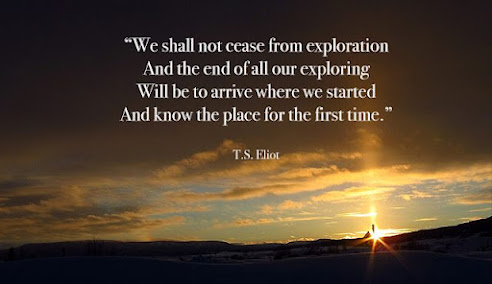"The Bottom Is Far Lower Than Anyone Believes Possible"
by Charles Hugh Smith
"All bubbles share common characteristics: during the euphoric expansion, participants are richly rewarded for buying every dip and for confidently embracing the belief that this time it's different. (Exactly how it's different changes from bubble to bubble, but the core mechanism is identical: for these entirely rational and "mathy" reasons, this time is truly different.)
The common characteristic when bubbles pop is the eventual bottom is far lower than anyone believes possible. This confidence in the bubble's permanence permeates the entire financial system and encourages a faith that buying every dip will continue to be the road to easy wealth. When euphoric risk-on switches polarity to risk-off, buying every dip becomes the road to ruin as the eventual bottom is incomprehensibly lower than the first stairstep down.
Here's a composite of what happened during the dot-com bubble burst. An Internet company that hit $90 per share has slipped to $60, and investment banks are recommending it at $60 based on "the Internet has endless growth ahead" and the loss of a third of its valuation makes it a relative bargain. The I>buy the dip crowd has already lost money buying every stairstep down, but a 30% decline must near the bottom, right?
Perhaps a 30% decline is the bottom in a risk-on market, but in a risk-off market, the eventual bottom isn't $60, it's $6 per share. In the optimistic, euphoric "this is permanent" risk-on phase, a $15 drop from $90 to $75 is a screaming buy. A decline to $60 is literally incomprehensible. The decline to $40 is a shock to the system because the rebound to $90 was the near-universal expectation. Those who could have sold at $85, $75, $65, $55 and $45 but did not are now so shell-shocked they cannot grasp that selling at $40 is the fantastic opportunity of a lifetime compared to selling at $9 or the eventual bottom at $6.
The mindset of decline is loss: those holding on for the "guaranteed" rebound to bubble highs can't bear to sell because that represents a loss of the profit that could have been reaped by selling at $90. Oh my, I've lost $50 per share of profit if I sell at $40. That's too painful to contemplate so instead the "diamond hands" punter holds on to the hope that the rebound from $40 to $90 is inevitable and merely a matter of patience (and yowza, I'll sell every share once it goes back up to $90).
But this isn't how risk-off markets function. Buy the dip rallies suck in true believers and then fade to new lows. Every new low is pronounced capitulation, i.e. the golden moment when every potential seller (weak hands) has sold and only strong hands are left. But only the oldest participants have experienced real capitulation and nobody listens to those old codgers because this time it's different and so the experience of ancient geezers doesn't apply.
Real capitulation is not an exciting flush and a soaring rebound. That's nothing but the late-stage euphoria of a risk-on market. Real risk-off capitulation is more like cleaning up after a giant party that ended badly. The unfortunate misadventures have been buried, the catatonic have been relegated to the funny farm, ahem, institutional care, and the walking wounded have gone back to the shattered shards of their pre-party lives or taken up residence in an RV just over the ridge from the Hotel California.
Those cleaning up the mess are tired and moving slowly. The clean-up and the drudgery seem endless. Nobody is in the mood to crack open a leftover bottle of champagne. They just want the pain to go away. The dream of the "guaranteed rebound" has dissipated, along with the confidence that this time it's different, easy wealth is one buy-the-dip away and strong hands are always rewarded with immense gains "because the Fed." Few players have the capital or desire to gamble in the casino that they mistakenly thought was rigged in their favor.
It was rigged in someone's favor, but not theirs. The smart hands were touting the stock at $80 and furiously (but oh so quietly) selling all the way down to those who had no experience in risk-off markets.
Nobody can fathom how low stocks can go at the eventual bottom. In a more recent example, consider the price action in a marijuana sector stock, Tilray (TLRY). Believers in the future prospects of the sector pushed the share price of TLRY to over $300. At the eventual capitulation low, shares traded hands in the $3 range-- a roughly 99% decline.
History is full of examples of 80% declines, 90%, 95% and yes, 99% declines. No one predicted the eventual capitulation low because such declines were inconceivable. Any decline could not possibly be more than three or four steps; a nightmarish fall into a chasm could not even be imagined.
And so here we are, witnessing the switch from risk-on to risk-off in real time. Retail investors are buying every dip with gusto, margin debt is at record highs and insiders are selling quietly but furiously as they race to dump all their over-valued shares on buy-the-dip believers in the permanence of risk-on euphoria and valuations.
From $900 to $90 is unimaginable. Yes, it is unimaginable now, but it will become conceivable as the risk-on bubble deflates, but too late for all those who clung on to the faith that risk-on euphoria is permanent. The final redoubt of risk-on markets is the confidence that I will get out at the top. The problem with this notion is there is no top in greed and hubris, and greed and hubris are the engines of risk-on markets. So please fall carefully into the chasm.
How do I know all this? Experience. Like most participants, I learned about risk-off markets and bubble pops the hard way, falling not-so carefully into the chasm."
○























